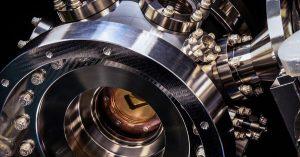Abu Dhabi unveils the first quantum supercomputer in the Middle East The team working at the “Institute for Technological Innovation” considers quantum capabilities a very important achievement for the Arab world It's about to become possible in Abu Dhabi - and in August. But it's not about escaping the summer heat. Quantum physicists at the Institute for Technological Innovation in the capital set out to build the first quantum computer in the Middle East.
In this context, senior researcher Paulos Alfakis told The National newspaper: “This will put the UAE on the map to become a well-known center for research on this topic. This is a great achievement for the entire Arab world. For the supercomputer's "brain" to work, the chip, which is a centimeter long and a centimeter wide, must operate in an extremely cold environment. For this purpose, two commutation refrigerators, capable of providing continuous deep freezing, arrived from Finland in huge wooden crates labeled "extremely fragile scientific equipment". As for the aluminum that will include the quantum tranche, it was produced by Emirates Global Aluminum in Abu Dhabi, and he did not have to move a long distance.

Professor José Ignacio Latorre, Head of Research at the Quantum Research Center, one of seven laboratories of the Institute for Technological Innovation, indicated that this is only the beginning of a long-term vision that envisages developing leadership in the field of advanced technology in the United Arab Emirates. A step he considers essential for national security and economic development.
He said, “There will be a dramatic difference between countries that possess technology and countries that depend on technology,” adding: “The UAE, like Singapore or Israel, (two countries) of similar size, cannot fully rely on allies. It has to develop its own technology strategies and it has to be independent. This is essential.” Futuristic, Faster, Better A quantum computer is a type of supercomputer, defined as a machine that can perform computing operations at a much faster rate than a normal modern version.
Unlike traditional computers, which use "bits" or "binaries" of ones and zeros, quantum computers use "qubits" and use quantum mechanics, where particles can exist in two states simultaneously. This greatly increases its computing power by allowing it to evaluate several outcomes simultaneously. The field is still in its infancy. And if some uses of a quantum computer in the real world began some time ago, future models of what a quantum computer might be able to accomplish one day, such as finding cures for cancer or answering questions about the origin of the universe, are still some years away. When these quantum processes begin, Abu Dhabi will focus its research on uses such as quantum algorithms for artificial intelligence, drug discovery, a new generation of navigation devices, and encryption that will make data more secure in a post-quantum world.
As Professor Latorre leads his team of 26 - a multinational group that includes Emirati, Chinese, Spanish and Portuguese members - to build a lab, he is also engaging the private sector in the UAE as well as universities with researchers in the field to identify ways of collaborating. He considered that efforts to develop quantum computing power would be "futile" without education and talent development.
He said, "We have to involve the country as a whole," adding, "We need companies, oil, gas, and communications...so that we are ready when new technology arrives...and these efforts should be combined with the efforts made in universities and they should involve the industrial sector as well. “The more educated people are, the more rational the planet should be.”